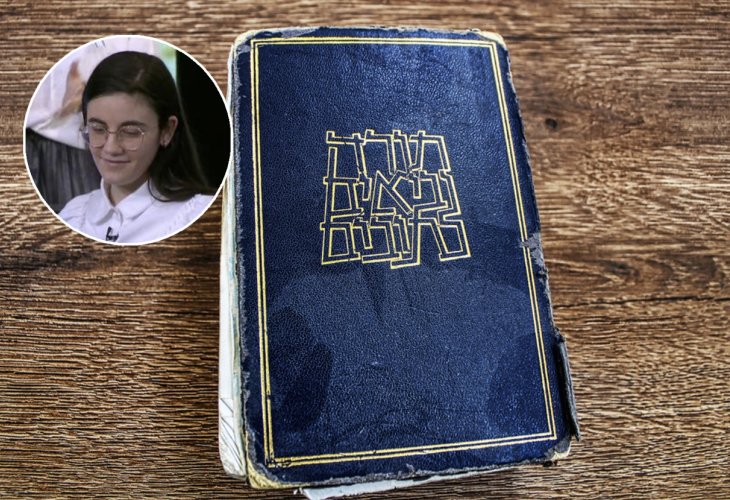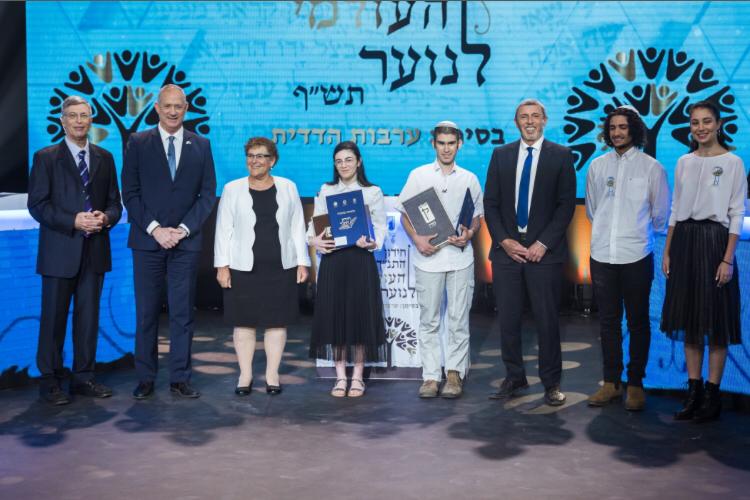Ruth Cohen, World Bible Contest Winner: "I Dreamed of Competing, but I Didn't Believe I Could Win"
Ruth Cohen breaks a decade-long male dominance by winning the World Bible Contest. On Shavuot, she reveals her self-doubt, desire to win, her rigorous study schedule, and her bible exam grades.
 (Inset: Ruth Cohen / Kan 11)
(Inset: Ruth Cohen / Kan 11)The coronavirus pandemic shook the world, disrupting even the established routines of the World Bible Contest. Yet, it couldn't stand in the way of Ruth Cohen's exceptional determination, making her the first girl to win the contest after a decade of male dominance. "I was exposed to the contest as a little girl," shares Ruth, 16, an 11th-grade student at the Har Beharan Seminary, living at Etrog Estate. "At home, it was part of our regular Independence Day experiences.
"I dreamed of competing from a young age, but I didn't believe I could succeed. The contestants seemed very mature and wise to me. Besides, there was such a vast amount of material, and I simply didn't believe in myself enough. When I was in 9th grade, I watched the contest, and there were successful 11th graders, and I thought to myself that in two years, I'd be their age and might succeed like them.
"After I began believing in myself a bit more, I simply started studying a lot. Wherever I went, the Bible went with me. I invested heavily in it, even if it meant giving up family or social events for my studies. For two years, it filled my entire schedule. I only did what was necessary in other areas; the rest of the time, I studied. Even while traveling. Despite all this, I believe the main thing that helped me succeed was self-belief, believing I would succeed."
Were there any particularly painful sacrifices during those two years?
"Initially, it was relatively okay, but in 11th grade, the sacrifices were significant. I understood that now was my time to invest in Bible study, and afterward, I'd focus on other things. I'm very happy I did it. When you really want something, the effort is worth the investment. Nonetheless, to experience some social life, I tried to study with friends as much as possible, and yes—it was a kind of leisure. During these two years, I occasionally heard comments like 'Why don’t you join us? Relax a bit,' but when I explained how important it was to me, they understood."
Support from Miriam Peretz
Ruth's efforts bore fruit, and after passing the school contest, she advanced through the regional, pre-national, national, pre-world, and finally the world contest. "In recent years, it was definitely the main focus of my life, and I'm very grateful to Hashem that it succeeded. I truly dedicated myself to it. For example, when I went to buy a side bag, I'd make sure it could fit a Bible before purchasing."
Why was it so important for you to succeed in the contest?
"I have a competitive nature, so I naturally wanted to win. But the true significance goes beyond that. It was important for me to win to prove to myself that I could. It says 'If you toil and find [success], believe.' But I mainly came to learn Bible. The Bible is the word of Hashem, a way of life, and I want to know it as much as possible. The Bible has always been present in my life. We learn the weekly Torah portion from a young age, and as you grow, you discover more in the Bible. Even in what you've already studied, new depths are revealed over time. There's no end to it.
"It’s true that the Bible also depicts historical events related to the people of Israel, but it's not just a history book. As I mentioned, the Bible is the word of Hashem, and as a religious girl, it's important for me to know it as much as possible. I think it's crucial to learn as much as possible from the Bible for our lives today. For instance, you can look at the righteous leaders from biblical times, compare them to our leaders today, and understand how we would like them to behave."
How did your final preparations for the contest look?
"Thank God, in the last two years, I've studied very seriously, but in the last three weeks, I definitely stepped up a gear. My goal was to learn at least 400 chapters a day, which is roughly the amount needed for the finals. During this time, I had several sleepless nights, and I thoroughly enjoyed them. In the week before the contest, I was very stressed, turned off my phone, barely left my room, and only studied Bible. My siblings brought me food to my room, and I'd eat very quickly. You could say I self-quarantined, not because of corona.
"The closer the contest got, the more I studied. On the day of the contest, while getting my makeup done, I studied as she did my makeup. It was a very stressful day. When it happens, you really want the day to be over, but afterward, you want to return to it. In the final stage, it was very tense and close, but then I got something right and the other contestant got it wrong, so I won."
What was the feeling when you realized you'd made it and fulfilled the dream?
"Of course, I was very excited when I won, and I also felt a great joy—mixed with feeling sorry for the one who lost. It was very emotional. Honestly, I’m still not fully digesting it. This year, the contest was particularly difficult because it was written by a new author who prepared harder questions, so I was especially happy. Another reason for my happiness was that, in the past ten years, boys won, and this year it changed. When we spoke with Miriam Peretz, who participated in the contest this year, she mentioned she wanted a female winner this year, and that’s exactly what happened. My family and friends supported me all the way, and I'm very grateful to them for that."
What changed in your life following the victory in the contest?
"The truth is, a lot. Last week, I walked in Jerusalem, and people recognized me on the street. I'm not used to being famous. Also, all the media interviews are a new experience for me. This year, I also invested less in my studies, and I need to return to that. Overall, I'm happy with this change, but I hope it won't burden me. I'm in favor of the publicity and everything related to it just to talk about the importance of studying the Bible; I'm not interested in personal fame."
Ruth can't help but mention that she feels a direct connection to Ruth the Moabite. "I'm named Ruth because I was born on Shavuot, and I feel very connected to Ruth the Moabite, mainly because she followed her beliefs despite the price she paid. Beyond that, Ruth joined Naomi quietly, went to Boaz discreetly, rose before dawn so as not to be seen, and I connect very much to not publicizing your actions. I don't see a contradiction between these things and the interviews I give because, again, it's not for self-promotion, but so people believe in themselves and so more people will study Bible."
Bridging the Bible
Due to the spread of the coronavirus, for the first time, the Bible contest was held without an audience, but this wasn't the only change in the contest's customary arrangements. "Corona started when we reached the national stage, resulting in the cancellation of the traditional participants' trip. Additionally, some exams were also canceled this year, which is actually nice. The final was held without an audience, and that was great because it was much less stressful."
Speaking of exams, may I ask what grade you got in the Bible matriculation exam?
"Anyone reaching the world contest automatically gets a hundred in Bible. My situation in this regard is good, thank God, but generally speaking, Bible studies among youths aren't doing well. It's very important to strengthen this, and I think we're not doing enough. I believe that if children and teenagers were exposed to Bible in a way that speaks to them, they'd love to engage with it. I connected to the Bible through competition because I love contests, but you can connect through trips following Bible stories for those who love traveling, writing and composing songs related to the Bible for those who love music, or in any other way.

"In any case, I intend to continue engaging with the Bible even after winning the contest. Since I delved deeply into Bible study, I've been writing Bible questions, both for myself and others. Over time, I realized I love asking questions as much as I love learning and answering them. Starting next year, with Hashem's help, I'll join the team that prepares questions for the different contest stages. In general, I'm considering a career related to the Bible, perhaps as a teacher or lecturer."
With all the positive things you've mentioned, what was the hardest part for you in the entire process?
"The most frustrating time for me was after the national stage. We received new material to study, but because of corona, there were constantly new instructions, and I was under pressure, in the final stretch, because I qualified for the world contest. Moreover, throughout my studies, I had this very challenging feeling because I often wanted to delve deeper into my studies but couldn't. There were chapters and stories in the Bible that I really wanted to study in depth, but due to the contest pressure, I couldn't allow myself that. Now, thank God, I can delve into these more. I'm really looking forward to it. I still have a lot to learn in the Bible. There's so much more for me to achieve."

